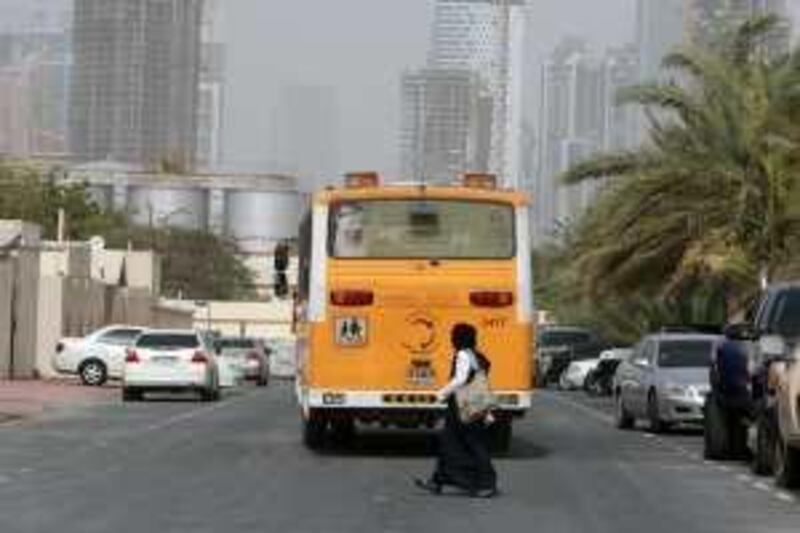DUBAI // More than a third of Dubai's 220 schools have been fined for violations of the emirate's new school bus safety rules. The regulations, drafted by the Roads and Transport Authority, were introduced after a number of pupils died in bus-related accidents across the country.
They require, among other things, that school buses be painted yellow for easy identification, that safety belts be fitted on certain seats, and that buses have a control system to limit their speed to 80kph. Bus drivers in Dubai are now also required to undergo special training and pass a police background check before being permitted to start work. Of the 248 tickets issued since the rules were introduced, 68 were for buses that did not comply with the regulations governing how buses should look and 56 were for drivers working without permits.
The total amount of fines collected was about Dh70,000 (US$19,000). One school principal, who asked to remain anonymous, described the new rules as "tough". "It's really difficult," he said. "They came in and they fined us since the driver did not have the driving permit. For that we had to send them for a medical checkup, for a police clearance. It takes time." He said the school would pay the fines but it would be a strain.
"It's a major problem," he said, adding that his school had already spent almost Dh100,000 to upgrade its fleet of buses. Another principal, Ghausia Iqbal from the Little Flowers School, said she supported the RTA's move. "It is good for the students' safety," she said. "If they are not following the rules then the children are not safe." Part of the problem in the past, Mrs Iqbal said, was that school buses could not be easily recognised.
"The buses are now yellow, so people are driving safely because they can recognise it's a school bus, so they will not be driving harsh behind the buses, they will not be honking." Another school principal, who also wished to remain anonymous, said he supported the rules, but wanted the fine for drivers without a permit to be reduced. He said it was a challenge to get a permit for new hires because of delays with visa processing and medical exams.
"In some cases there has not been proper co-ordination between the RTA and the medical department," he said. "The drivers have to go to the clinic to have their medical inspection and there have been delays." He suggested that schools be given a grace period to secure permits for new drivers. During the 2006-07 school year there were 81 school bus accidents in Dubai, resulting in one death and six injuries.
More recently, a number of children have been killed by passing vehicles after disembarking from school buses or have died of heatstroke after being left unattended in buses. These and other incidents prompted the Ministry of Education to announce in February 2009 that all state and private schools would have to hire supervisors to ride on buses with primary school children. A total of Dh10 million was earmarked to hire school bus monitors for state schools and schools were given Dh500 per month towards their salaries.
The RTA's regulations and fines in Dubai represent an even more stringent approach to bus safety. klewis@thenational.ae






